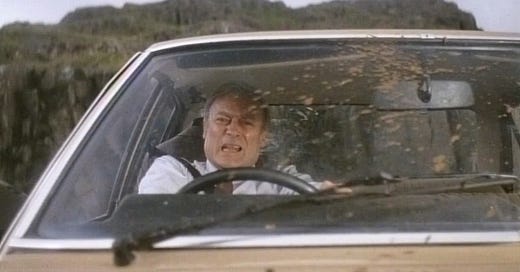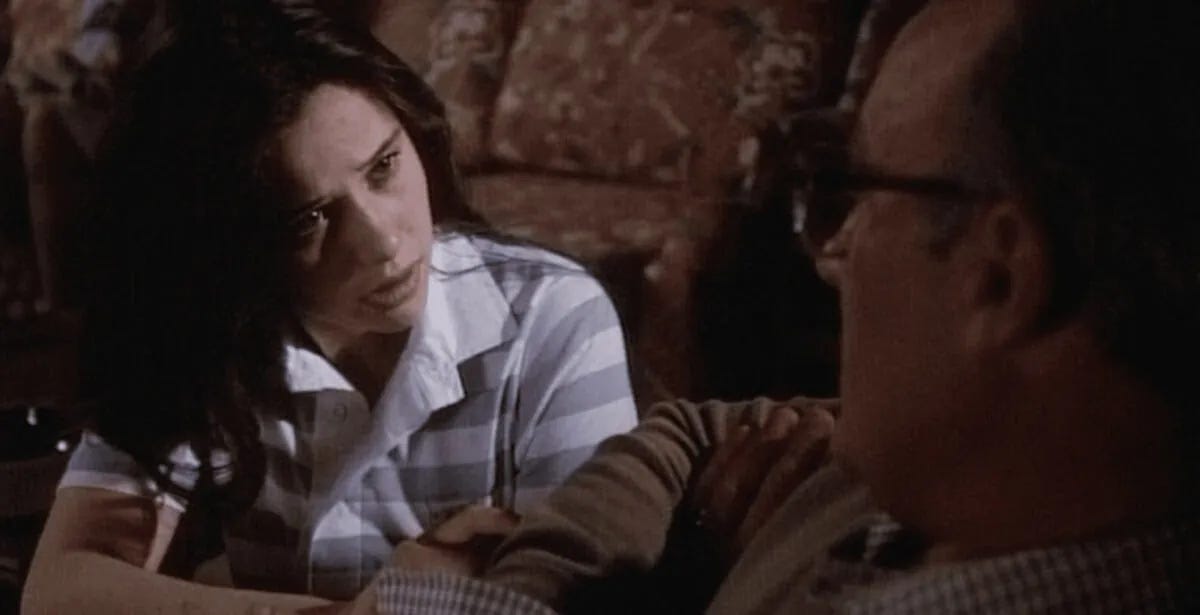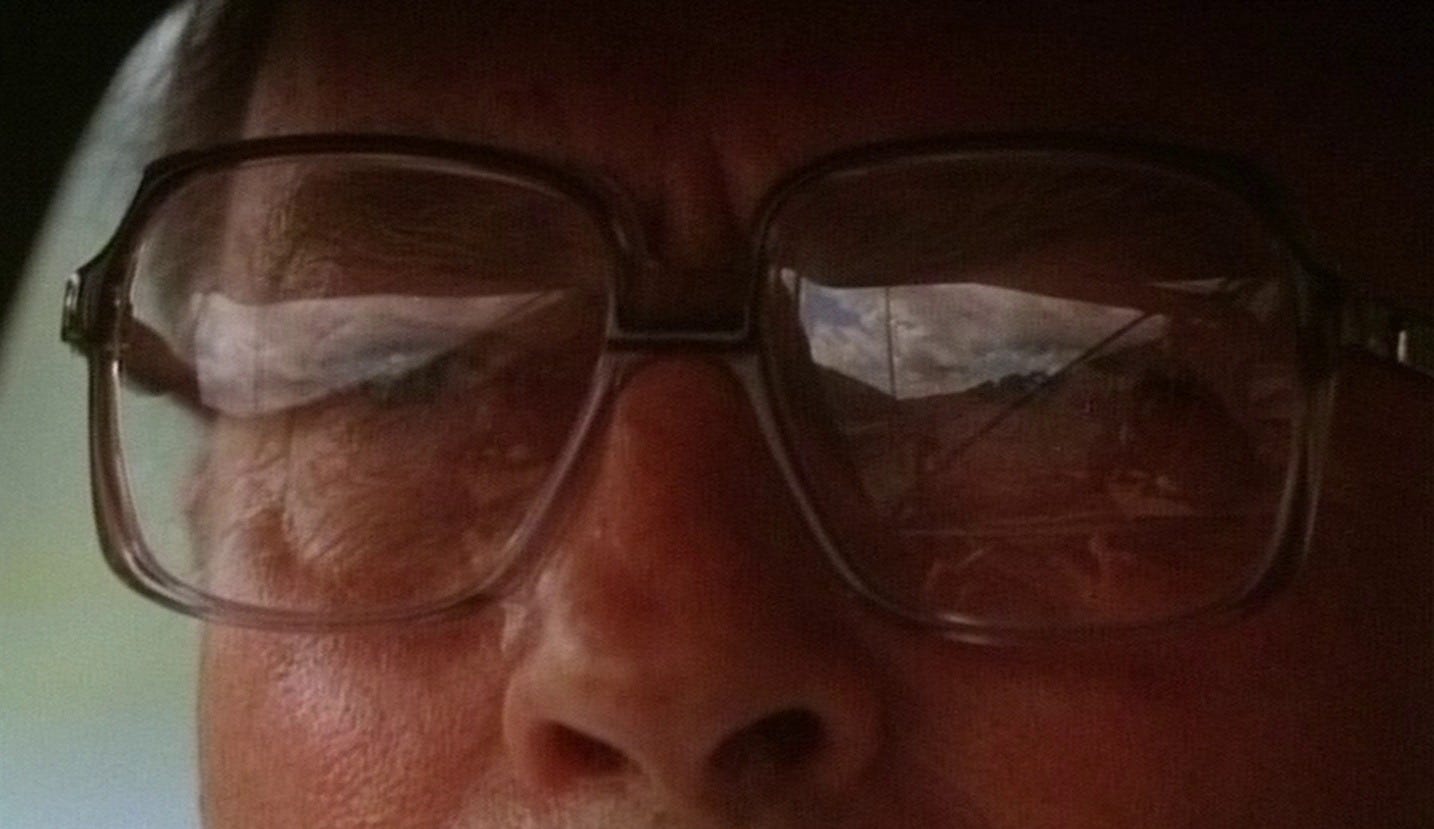Spoilers for The Appointment (1982)
Lindsey C. Vickers made only one full-length feature, itself a high-budget television film that was designed to kick off a series of productions for both the UK and America. Instead, plans fell through, and The Appointment was quietly released on home media before being thought lost for four decades.
Released in a stunning Blu-ray package by the BFI in 2022, we can now see this off-kilter horror film in all its glory. I say off-kilter because it never really abides by the genre rules. Instead, it starts with a shocking jump scare and then slows the pace right down until it’s gloriously over-the-top finale.
Ian (Edward Woodward) is called away on a business trip and is forced to a recital by his daughter Joanne (Samantha Weyson). Her disappointment unearths hints of a more disturbing relationship between the pair, including one unsettling dream that Ian has before his travels.
In fact, both Ian and his wife Dianna (Jane Merrow) have restless nights before he leaves. Dreams of crashed cars and aggressive rottweilers haunt them, and its this use of dream logic that Vickers uses to great effect throughout the film.
Many of the sequences would be ridiculous if taken at face value. It’s only with the atmosphere of wrongness that has been developed throughout that the film manages to be deeply unsettling. Like events in a dream, the individual components don’t have to make sense objectively; they just have to make sense when put together.
Take, for example, the death of the mechanic Mark (John Judd). He’s busy fixing a car, hundreds of miles away from his friend Ian, but when Ian attempts to start his courtesy car Mark’s head becomes caught in the transmission of the broken-down vehicle, killing him. It has that feeling of a death from The Omen (Richard Donner, 1976), where inexplicable forces come together.
Yet it’s the components that converge to create the climatic car crash that highlight the dream logic in the film. Some aspects of it are signposted in the earlier dream sequences. Ian will be trapped in the car after the crash. But others are replaced with imagery. The rottweilers, which have a physical presence early in the film, and are one possible link to show that Joanne is somehow controlling events, are shown jumping on the bonnet and windscreen, yet it is unclear how they will play a role in the crash.
Then there’s the way time and location change. Ian says that his appointment is just outside of London but adds that it’s hundreds of miles away – an anomaly considering they appear to be based around Hertfordshire. Then when he does crash the car, it’s clearly on one of the roads snaking through Snowdonia. This deliberate contortion of time and area would be lost on international audiences, but for UK viewers it disorientates. Like in a dream, Ian seems to transport from area to area.
When the crash finally does happen, minor plots converge with the major themes highlighted. An oil plug that rattled loose under the car causes the brakes to fail (another non-sensical point that you could imagine fuelling a dream) and Ian nearly collides with a lorry decorated with three rottweilers.
The dogs were never a physical threat, but they still very nearly run right over the car.
Careening through the barricade, the car sits unnaturally on the front fender before crashing down into the trees below, Ian finds himself trapped in the car, just as Dianna and he had feared. Only in a final cruel twist, the reason he is trapped is because the car is upside down, delicately balanced on the branches. The smallest movement threatens to send the car crashing down to the forest floor.
We’re left wondering if Joanne has somehow cursed her father for missing her recital; perhaps making a deal with the three rottweilers that appear to her early in the film. Yet this doesn’t work either, because she was unaware that her father would let her down at this point. Then the only other option is that the whole film is a dream, following that rabbit hole in which the smallest action exponentially grows to something terrifying.
Ian’s guilt over not attending the recital; perhaps even guilt over his thoughts about his teenage daughter. His concerns over what will happen if he continues to pander to her wants and needs. The Appointment leaves you confused and unsettled, like all the worst dreams do.
Writer/director: Lindsey C. Vickers
Starring: Edward Woodward, Jane Merrow, Samantha Weyson, John Judd









